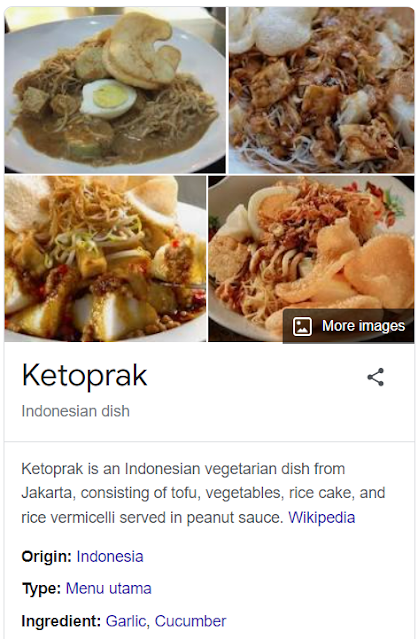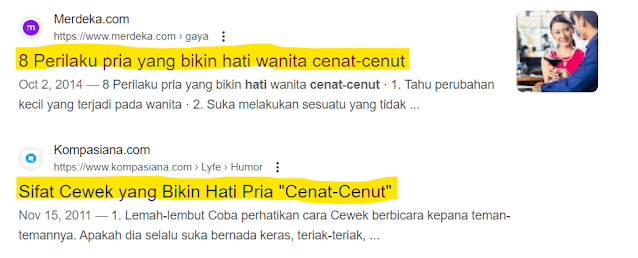- Get link
- X
- Other Apps
Posted by
Iman Prabawa
on
- Get link
- X
- Other Apps
Halo semuanya, ketemu lagi sama saya, Iman Prabawa. In this article, I want to talk to you about the meaning of the phrase [cenat-cenut] in Indonesian. As always, we are going to be watching examples from YouTube videos, movies, comics, or others where Indonesians use the phrase [cenat-cenut].
If you have any questions regarding the Indonesian language, you can ask me directly. You can see how to do that on my About Me page.
If you are a beginner in the Indonesian language, you can learn step by step with My Lesson Here.
Without further ado, let's talk about this. Cenat-Cenut In Indonesian
[Cenat-cenut] actually comes from the Javanese language. According to Kamus Bahasa Jawa Indonesia (KBJI), [cenat-cenut] means,
Terasa sakit seperti ditusuk-tusuk.
Which translates to English as,
It hurts like being stabbed.
So, [cenat-cenut] literally means something that is hurting you. Usually, the hurt you feel in your head or in your teeth. The pain of [cenat-cenut] is sharp pain like you are being stabbed.
Example sentence:
1. A: Kepala gue rasanya cenat-cenut nih. (I have a headache.)
B: Ke dokter gih? (Why don't you see a doctor?)
2. Loe ada obat Ponstan ngga? Gigi gue sakit banget! Cenat-cenut gitu. (Do you have Ponstan? My teeth really hurt! It's like being stabbed.)
[Cenat-cenut] also has a figurative meaning. [Cenat-cenut], in figurative meanings, means something that makes your heart melt or you can't stop thinking about it.
Example sentence:
1. 8 perilaku pria yang bikin hati wanita cenat-cenut. (8 male behaviors that make women's hearts melt.)
2. Sifat cewek yang bikin hati pria cenat-cenut. (Girl's attitude that makes a guy's heart flutter.)
How to Pronounce Cenat-Cenut
Here is how you pronounce [cenat-cenut] in bahasa Indonesia.
Moving on, let's watch examples where Indonesians use the phrase [cenat-cenut].
Examples of Cenat-Cenut In Use
The first example is taken from Bang Mpin's YouTube Channel. Let's watch the clip below.
Below is what Bang Mpin says in the clip above with English translations.
Bang Mpin: Kemaren, pas gue lagi makan ketoprak. Enak tuh! Ada sate ayam keknya enak. Eh, pas gue lewat ternyata ada yang jual sate kulit atau sate telor atau sate kambing. Beuh! Emang kalo pagi-pagi itu kita butuh asupan-asupan kolesterol, gaes. Butuh yang bikin kenceng-kenceng kepala. Butuh yang bikin kepala-kepala cenat-cenut. Nah ini yang terbaik nih! (Yesterday, when I was eating ketoprak. That's delicious! I saw chicken satay that looks so delicious. And when I passed by it, it turned out there was someone selling skin satay or, egg satay or goat satay. Oooh! Indeed, early in the morning, we need cholesterol intake, guys. Need something that makes your head spin. You need something that makes your head feel tense. Well, this is the best!)
In this clip, the meaning of [cenat-cenut] is in literal meaning, but he says it jokingly. So, it means to have a little tension in your head because if you consume these kinds of foods in large quantities, you will likely start to feel pain in your head.
Vocabulary From the Clip
[Kemaren] is informal for [kemarin] = yesterday.
[Pas] = when. For more about this, you can read my article here, Pas In Indonesian.
[Gue] is informal for [saya] = I. For more about this, you can read my article here, Gue In Indonesian.
[Lagi] = [sedang] means in the process of doing something.
[Makan] = eat.
[Ketoprak] is one of the Indonesian dishes that looks like the picture below.
 |
| Ketoprak |
[Tuh] is informal for [itu] = that. For more about this, you can read my article here: Itu, Tu, and Tuh in Indonesian.
[Sate ayam] = chicken satay.
[Jual] = sell.
[Beuh] is an exclamation when you are surprised because of something, but here, Bang Mpin imagines those foods, sate ayam, sate kulit, and sate kambing, and suddenly his mouth is drooling. That's why he says [beuh].
[Emang] is a common reduction for [memang] = indeed.
[Kalo] is informal for [kalau] = if.
[Pagi-pagi] = [pagi hari] = morning.
[Kenceng] is informal for [kencang] = tight.
[Kepala] = head.
[Nih] is informal for [ini] = this. For more about this, you can read my article here: Ini, Ni, and Nih in Indonesian.
Read also: Lho In Indonesian
That wraps up today's article. If I find another example, Insha Allah, I will update this article again. Thank you, and I'll see you soon. Buh-bye.
- Get link
- X
- Other Apps
Hello, I'm Iman Prabawa a.k.a Pak Guru Iman. I love to share about languages. My Instagram, @iman_prabawa


Comments
Post a Comment